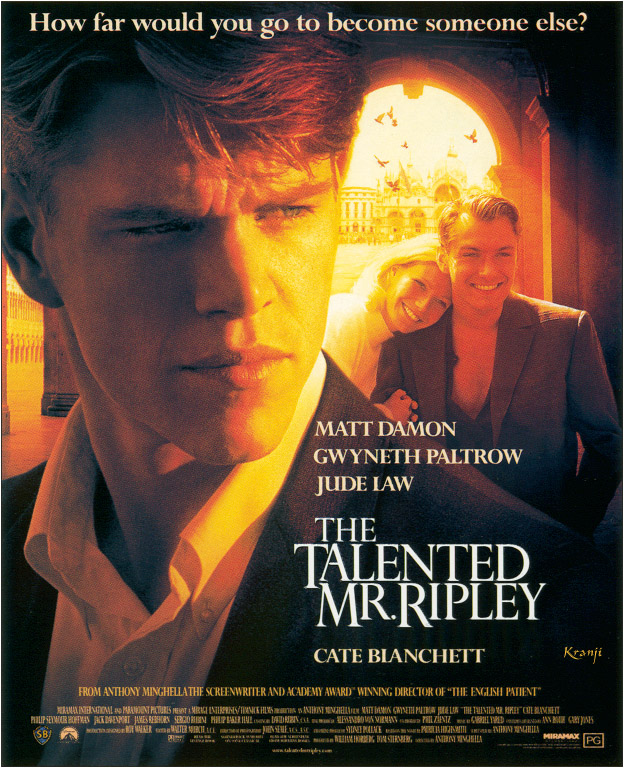 Do you love beautiful scenery in Italy? Rome, Venice, Naples? Do you love good music of all types? Opera, Schubert trios, Classic Jazz, obscure Italian pop songs from 1958? Do you enjoy Matt Damon, Gyweneth Paltrow, Cate Blanchet, Jude Law and director Anthony Minghella? Then this MIGHT be a movie for you.
Do you love beautiful scenery in Italy? Rome, Venice, Naples? Do you love good music of all types? Opera, Schubert trios, Classic Jazz, obscure Italian pop songs from 1958? Do you enjoy Matt Damon, Gyweneth Paltrow, Cate Blanchet, Jude Law and director Anthony Minghella? Then this MIGHT be a movie for you. Then again it might not be, as a theme of the movie is "trouble in paradise."
The basic story is about a young man, "Mr. Ripley," played by Matt Damon who is sent by a wealthy ship builder (Mr. Greenleaf) to Italy to bring his spoiled young adult son back to America. Ripley is mistaken for a Princeton alumni, because he is wearing someone else's Princeton jacket, but he never has the guts to correct Mr. Greenleaf, who honestly thinks that he must have known his son, Dickie (played by Jude Law who affects a very good American accent). Thus the whole adventure begins because of a willfully allowed misunderstanding. As Ripley says, however, "I would rather be a fake somebody, rather than a real nobody.")
Ripley, takes advantage of the situation to see Italy and pal around with the Princeton alum ex-patriot rich kids over there. He and Dickie become friends and conspire to keep the charade going. Well, this is a troubled young man - a homosexual - and he ultimately develops a crush on Dickie Greenleaf. Dickie is not exactly Mr. Clean-Bill-of-Moral/Psychological-Health, himself. He has a main girlfriend, played by Gweneth Paltrow (Marge) who wants marriage, but has other "girlfriends" as well. He gets one of the local village girls pregnant, and she commits suicide.
So he has problems, but the basic human social skills and normal developments are there. He likes women - although in a very self-centered and destructive way.
Anyway, when Ripley reveals his feelings for Dickie he gets rebuffed and then an ugly scene ensues and a fight and Dickie ends up dead. This takes place in a row boat. The scene ends with an overview shot of Ripley laying down and hugging Dickie Greenleaf's lifeless body in the row boat which is rocking in an absolutely gorgeously blue Adriatic Sea.
This is a visual symbol of the theme of the movie which is "trouble in paradise." Gorgeous beauty outside, but all is not well. It also perfectly illustrates Ripley's psycho-sexual immaturity. He is not a well-developed man. First of all, his love is wrongly directed, then when it is rebuffed it turns violent, finally when he kills his "beloved" (not on purpose, though, it was "involuntary manslaughter" and partly accidental) he turns smarmy and sentimental. The visual symbol is beautiful and yet creepy. He is hugging someone who cannot choose to "hug back," but neither can a dead body refuse an embrace. (So that's good enough for him?) Kind of like a child hugging a teddy bear. An immature love. OK for a 2 year old, but a 24 year old?
And this is one of the things - aside from the gorgeous scenery and music - which I enjoyed about the movie. Verisimilitude. Even though all of the people who made the movie were classic Hollywood liberals (i.e. pro-homosexual). The psychosexual-development issues which generally lead to male homosexuality were all present in Matt Damon's character. I don't think this was the conscious intent of the director, at least judging from his commentary. And Minghella might even have denied this, claiming that Ripley was merely a "repressed homosexual" who needed to be freed up. Indeed there is a more "mature homosexual" in the movie for a brief time. I suppose for balance. Nonetheless, the characterization of the Ripley character by Damon (and Minghella and whoever the script writer was) is quite spot on - especially for those of us who have had to deal with male homosexuals (and you do in the secular art world).
Not to give the whole plot away, but it gets worse. Because Ripley looks somewhat like Dickie Greenleaf, he is able to pass himself off to people who didn't know Dickie using his passport. He steals his identity. But then he has to be "himself" around all of the people who did know Dickie well, and yet keep Dickie alive by claiming that he had just seen him or talked to him. (Dickie's body never turns up because Ripley buried it at sea).
Furthermore, the people who think Ripley is Dickie talk to the people who know he is not Dickie and he has to be very careful not to be in the same room with both groups of people. There are some very close escapes.
Well, he kills other people to keep this charade alive, but he is so good he never gets caught - but in a sense he wants to be caught and end the whole thing, but of course he can't quite do that. This is a line of deceptions which started with Mr. Greenleaf. He can't stop. He has a compulsion. And this is his punishment. Kind of like a Greek myth - the myth of Sisyphus? - he is doomed to stay in this state of guilt all by himself endlessly, because of his one talent of lying and deception.
The tension is almost unbearable, but the only way out is to confess, but with the bodies piling up (3-4 murders? I forget), this would mean life in prison if not execution.
He is trapped.
Because he wanted to be a fake somebody, he is loaded down with guilt and is all alone - a real nobody.
No comments:
Post a Comment